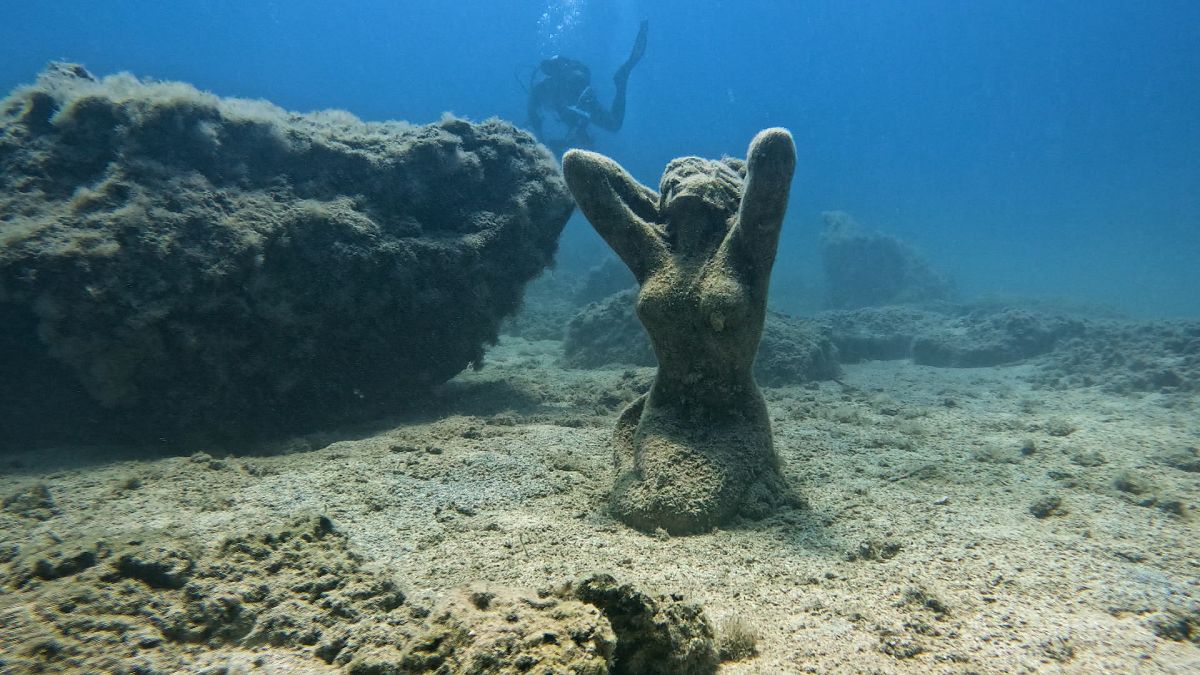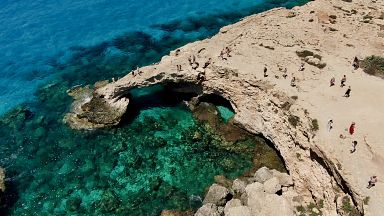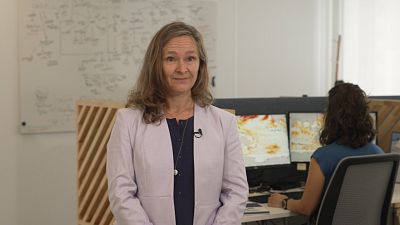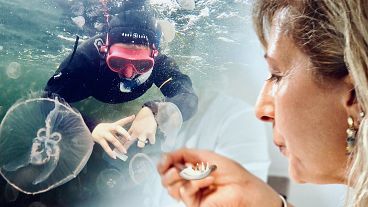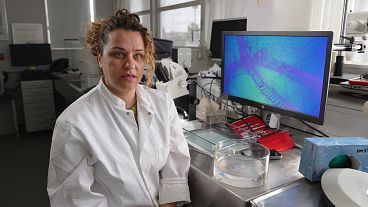The research team from the Cyprus Marine and Maritime Institute has invited us to witness the devastating impact of these heatwaves on fragile underwater ecosystems.
In Cyprus, record-shattering temperatures are scorching both the land and the surrounding sea.
Warm seas feel great on holiday, but for marine life, they can be devastating. As ocean temperatures spike for longer and longer periods, how severe is the threat to underwater ecosystems — and can we do anything to prevent the worst?
“The visibility is not that good today — normally it's crystal clear," says Louis Hadjioannou, Researcher in Marine Ecology at the CMMI in Cyrprus, as he leads today's dive.
What’s obvious is this coastline near Larnaca, is in trouble. Last year, it was a lush seagrass meadow, a haven for sea turtles and stingrays. Now, it's a lifeless expanse, littered with the remains of once-thriving sponges.
“We are a hotspot of rising temperatures, both outside the water but also inside the water. And these increasing temperatures, which are becoming more intense, more prolonged and more high, they are obviously affecting organisms. And the worst that can happen to them is death. They die," Hadjioannou explains.
Invasive species
As native life struggles with rising heat, alien species from the nearby Red Sea are migrating in, further disrupting the ecosystem.
“Now with increasing temperatures, we have a lot more new species that manage to pass through the Suez channel in some way. And they find favourable conditions to thrive. And in many cases, these new species, they outcompete native species, they displace them, and they cause a multitude of problems," says Hadjioannou.
For over a decade, Cyprus researchers have closely tracked rising marine temperatures with special underwater sensors.
“We are now approaching the spot where we have our data logger deployed," he explains.
Recordings show that Cyprus's waters are warming year-round, especially in the shallows where life depends on delicate coral reefs. The team photographs the coral to document changes over time.
The CMMI team is part of two European-funded research projects —PUREEF-Y and EFFECTIVE —studying the impact of marine heatwaves on shallow reefs and seeking nature-based solutions to protect and restore seabed ecosystems before they are lost forever.
“We will try to collect some sediment samples. By taking core samples of either the sediment or the actual reefs, you can understand how the climate was in the past from the very bottom of the sample, and then you go all the way up through the core sample to understand how it changes through the years, all the way up to today," explains Hadjioannou.
Sediment analysis reveals how heatwaves affect pollution levels and other variables.
“Another thing that we do investigate in sediment is the meiofauna. Meiofauna are small organisms, and their biodiversity is really dependent on the temperature, nutrients and other conditions. Many species could even go extinct because the water is too hot or the sediment is too hot, or the nutrients have changed because of climate change and heat waves," says Eleni Christoforou, a Marine biologist at the CMMI.
The crisis in Cyprus's waters is just one example of a global phenomenon closely monitored by oceanographers at Mercator Ocean International in Toulouse, France.
Dr. Karina von Schuckmann, an oceanographer specialised in ocean climate monitoring and lead author of the Intergovernmental Panel on Climate Change reports, explains that these intensifying heatwaves are one of the consequences of our planet’s heat imbalance.
“Marine heatwaves can occur because there are heatwaves taking place in the atmosphere. So we have this interaction between the atmosphere and the ocean and then the ocean is heating up, the wind slowing down, etcetera, favouring these conditions. We have seen in the last IPCC that it increases in general for the extremes — that we have higher intensities, and also the frequency of these extremes is increasing," she explains.
Spreading like wildfires
Marine heatwaves—prolonged periods of unusually high seawater temperatures—are spreading like wildfires across oceans worldwide. They threaten ecosystems, fisheries, aquaculture, and tourism, and can last for weeks, months, or even years.
In the Mediterranean, sea surface temperatures have been rising continuously since the 1980s, a trend expected to continue throughout the 21st century.
To better understand and forecast marine heatwaves, Mercator Ocean has developed advanced computer models implementing the Copernicus Marine Service — part of the EU's Copernicus Programme.
"We collect all available observations - satellite data, and what we call in-situ, which means measurements taken at sea, with autonomous buoys, ships and all kinds of measuring instruments. We integrate all these observations into a modelling solution. We make a forecast for the next ten days, which allows us to know if there will still be a marine heatwave in the same location a week from now, or if it will evolve in one way or another. And we publish bulletins every week to report on the current state of affairs," explains Marie Drevillon, an Oceanographer at Mercator Ocean International.
"We need to understand what biodiversity will be destroyed permanently, what the impact on us will be, what changes it will bring to the major balances, and most importantly, how we can prevent the continued disaster we have inflicted on the ocean," adds Pierre Bahurel, the Director General at Mercator Ocean International.
Scientists estimate that 90% of the world’s remaining coral reefs could be lost by 2050.
To bolster reef resilience, Louis Hadjioannou's team in Cyprus is experimenting with coral nurseries. They place fragments of endangered coral species in a safe area, away from predators.
The goal is for these coral fragments to grow in the protected nursery and later be transplanted to the seabed, aiding in the regeneration of healthy reef ecosystems.
“Here we are at the floating nursery. It's the first time we're testing these kind of floating nurseries in the Mediterranean for any species. We're going to install the corals and we're going to monitor them for at least a year using photogrammetry and other visual methods," explains Hadjioannou.
It remains to be seen how well these corals will fare in the warming sea.
“Now it's the peak time of heat waves. We will continue deploying and installing more coral fragments on the floating nursery at different seasons to see how they will behave," says Hadjioannou.
Adding that: “We're by now certain that the sea will be different in ten, twenty years. We're making efforts to at least try to save some of the key species that support the rest of the biodiversity, in the hope that the change that will come, for sure, will not be so bad, or fatal, on the marine life.”
As the ocean keeps heating up, time is running out for many species facing a future they may not survive.












